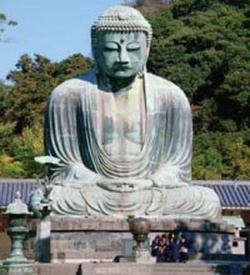Difference between revisions of "Three mysteries"
(Created page with "thumb|250px| <poem> '''three mysteries''' [三密] (Jpn san-mitsu ) Also, three secrets. Three mysteries of body, mouth, and mind. A princi...") |
|||
| Line 1: | Line 1: | ||
[[File:Japan.jpg|thumb|250px|]] | [[File:Japan.jpg|thumb|250px|]] | ||
<poem> | <poem> | ||
| − | + | [[three mysteries]] | |
| − | [三密] (Jpn san-mitsu ) | + | [[三密]] (Jpn [[san-mitsu]] ) |
Also, three secrets. | Also, three secrets. | ||
| − | Three mysteries of | + | Three {{Wiki|mysteries}} of |
| − | body, | + | [[body]], |
| − | mouth, | + | {{Wiki|mouth}}, |
| − | and mind. | + | and [[mind]]. |
| − | A principle of Esoteric Buddhism. According to Esoteric Buddhism, since Mahavairochana Buddha (the Buddha depicted in esoteric sutras) is omnipresent, all beings are the mystic body of that Buddha, all sounds his mystic mouth (voice), and all thoughts his mystic mind. | + | A [[principle]] of [[Esoteric Buddhism]]. According to [[Esoteric Buddhism]], since [[Mahavairochana Buddha]] (the [[Buddha]] depicted in [[esoteric]] [[sutras]]) is {{Wiki|omnipresent}}, all [[beings]] are the [[mystic]] [[body]] of that [[Buddha]], all {{Wiki|sounds}} his [[mystic]] {{Wiki|mouth}} ({{Wiki|voice}}), and all [[thoughts]] his [[mystic]] [[mind]]. |
| − | Yet, because the Buddha's | + | Yet, because the [[Buddha's]] |
| − | body, | + | [[body]], |
| − | mouth, | + | {{Wiki|mouth}}, |
| − | and mind | + | and [[mind]] |
| − | are unimaginably profound and beyond ordinary people's understanding, these aspects are called "mysteries." | + | are unimaginably profound and beyond ordinary people's [[understanding]], these aspects are called "{{Wiki|mysteries}}." |
Moreover, the | Moreover, the | ||
| − | body, | + | [[body]], |
| − | mouth, | + | {{Wiki|mouth}}, |
| − | and mind | + | and [[mind]] |
| − | of ordinary people are not essentially different from those of the Buddha, although their Buddha nature is obscured by illusions. | + | of [[ordinary people]] are not [[essentially]] different from those of the [[Buddha]], although their [[Buddha nature]] is obscured by [[illusions]]. |
| − | In this sense, | + | In this [[sense]], |
| − | the body, | + | the [[body]], |
| − | mouth, | + | {{Wiki|mouth}}, |
| − | and mind | + | and [[mind]] |
| − | of ordinary people in their essential aspect are also called the three mysteries. In terms of practice, the mystery of the body means the forming of mudras, which are gestures with the hands and fingers; the mystery of the mouth refers to the recitation of mantras, or mystic formulas; and the mystery of the mind indicates meditation on an esoteric mandala or one of the figures appearing in it. | + | of [[ordinary people]] in their [[essential]] aspect are also called the three {{Wiki|mysteries}}. In terms of practice, the {{Wiki|mystery}} of the [[body]] means the forming of [[mudras]], which are gestures with the hands and fingers; the {{Wiki|mystery}} of the {{Wiki|mouth}} refers to the {{Wiki|recitation}} of [[mantras]], or [[mystic]] [[formulas]]; and the {{Wiki|mystery}} of the [[mind]] indicates [[meditation]] on an [[esoteric]] [[mandala]] or one of the figures appearing in it. |
| − | Esoteric Buddhism teaches that, through these three practices, | + | [[Esoteric Buddhism]] teaches that, through these three practices, |
| − | the body, | + | the [[body]], |
| − | mouth, | + | {{Wiki|mouth}}, |
| − | and mind | + | and [[mind]] |
| − | of ordinary people are united with those of Mahavairochana Buddha, thus enabling them to attain Buddhahood in their present form. | + | of [[ordinary people]] are united with those of [[Mahavairochana Buddha]], thus enabling them to attain [[Buddhahood]] in their {{Wiki|present}} [[form]]. |
</poem> | </poem> | ||
{{R}} | {{R}} | ||
[http://www.sgilibrary.org/search_dict.php?SearchSelect=dict&p=7&m=1&in=2&q=Meditation www.sgilibrary.org] | [http://www.sgilibrary.org/search_dict.php?SearchSelect=dict&p=7&m=1&in=2&q=Meditation www.sgilibrary.org] | ||
[[Category:Buddhist Terms]] | [[Category:Buddhist Terms]] | ||
Revision as of 23:21, 10 February 2014
three mysteries
三密 (Jpn san-mitsu )
Also, three secrets.
Three mysteries of
body,
mouth,
and mind.
A principle of Esoteric Buddhism. According to Esoteric Buddhism, since Mahavairochana Buddha (the Buddha depicted in esoteric sutras) is omnipresent, all beings are the mystic body of that Buddha, all sounds his mystic mouth (voice), and all thoughts his mystic mind.
Yet, because the Buddha's
body,
mouth,
and mind
are unimaginably profound and beyond ordinary people's understanding, these aspects are called "mysteries."
Moreover, the
body,
mouth,
and mind
of ordinary people are not essentially different from those of the Buddha, although their Buddha nature is obscured by illusions.
In this sense,
the body,
mouth,
and mind
of ordinary people in their essential aspect are also called the three mysteries. In terms of practice, the mystery of the body means the forming of mudras, which are gestures with the hands and fingers; the mystery of the mouth refers to the recitation of mantras, or mystic formulas; and the mystery of the mind indicates meditation on an esoteric mandala or one of the figures appearing in it.
Esoteric Buddhism teaches that, through these three practices,
the body,
mouth,
and mind
of ordinary people are united with those of Mahavairochana Buddha, thus enabling them to attain Buddhahood in their present form.
